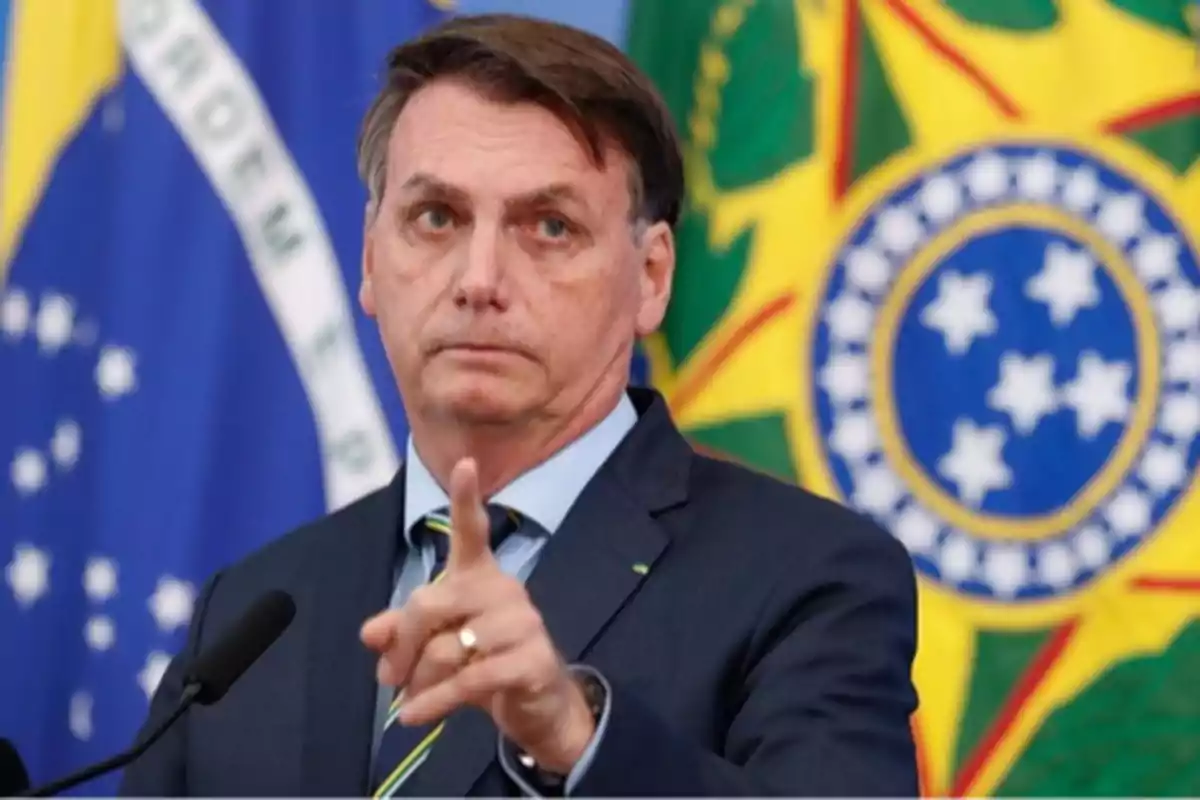
Eduardo Bolsonaro after his father's arrest: 'Brazil is no longer a democracy'
The son of the former president called on the people to 'not stay silent' after the illegitimate arrest by Lula's dictatorship
In an alarming turn for the institutional stability of Brazil and the region, former president Jair Bolsonaro was placed under house arrest by order of Judge Alexandre de Moraes, in a move that caused strong international condemnation and renewed allegations of political persecution. The measure, based on alleged violations of previous restrictions, was described by experts and world leaders as an unprecedented abuse of power in the country's recent democratic history.
The event triggered a wave of immediate reactions, starting with his son, Congressman Eduardo Bolsonaro, who issued an urgent message to the international community: "Brazil crossed the line. Bolsonaro was arrested not for a crime, not for corruption, but for greeting protesters from his home. Brazil is no longer a democracy. We live under a judicial dictatorship disguised as justice. The regime panicked. Do not remain silent."
Eduardo Bolsonaro lanzó un mensaje urgente al mundo tras el arresto de su padre, Jair Bolsonaro: "Brasil cruzó la linea. Bolsonaro fue arrestado no por un delito, no por corrupción, sino por saludar a manifestantes desde su casa. Brasil ya no es una democ
Eduardo Bolsonaro publicly urged Argentina and the rest of the OAS member countries to consider activating the Inter-American Democratic Clause, provided for in the organization's Democratic Charter. The request is based on the arbitrary detention of Jair Bolsonaro without prior conviction, which, according to the legislator, constitutes a breach of the constitutional order in Brazil.
If this clause is activated, the Organization of American States could initiate a formal process to assess the Brazilian institutional situation, enabling mechanisms such as the deployment of international observers, the issuance of reform recommendations, and, in serious cases, the suspension of Brazil from the continental body for violations of democratic principles.
Meanwhile, support is growing in Europe. The European Union, through allied parliamentarians from the conservative bloc, formally requested its member states to join the sanctions promoted by the United States against Alexandre de Moraes, accusing him of undermining essential rights and due process. Transatlantic coordination in denouncing the excesses of the Supreme Federal Court could mark a diplomatic turning point and lay the groundwork for a coordinated international response to the authoritarian advance of the Brazilian judicial system.
The most forceful response came from Washington. Through its Bureau of Western Hemisphere Affairs, the State Department condemned the decision of the Supreme Federal Court and accused Judge Moraes of being a "direct threat to democracy." "Let Bolsonaro speak," was the direct message disseminated by the bureau, alluding to the restrictions preventing the former president from expressing himself publicly.
Judge Alexandre de Moraes had already been sanctioned by the U.S. under the Magnitsky Act, a legal tool that allows for the punishment of foreign nationals involved in corruption or human rights violations. Attention now focuses on Viviane Barci de Moraes, the judge's wife, identified by Eduardo Bolsonaro as "the financial arm" of her husband.

Since his return to power, Luiz Inácio Lula da Silva has consolidated a systematic strategy of political neutralization against Bolsonaro, the main opposition figure. The restrictions imposed by the STF—including the prohibition on using social media or participating in public events—violate basic constitutional rights and, according to international observers, respond more to an attempt at proscription than to the application of justice.
The excuse used this time was Bolsonaro's participation via video call in a peaceful demonstration, which allegedly violated the conditions imposed by the court. However, his defense denies having committed any infraction.

Since February, Eduardo Bolsonaro has been in the United States negotiating sanctions against Brazilian authorities and gathering support for his father. In statements to the media outlet Metrópoles, he asserted that the U.S. government "already has material to sanction various authorities" and warned that the measures could extend to the families of STF judges.
"We are going to wait and see what will be done, but we believe there will be a response commensurate with the situation", he declared. The congressman also announced that he is preparing a tour of Europe to promote new sanctions and warn about the Brazilian authoritarian drift: "Most likely, we will have our bags packed to go to Europe to do this same work. Because I am not going to give up on Brazil."
He also denounced that "the law firms of Alexandre de Moraes's wife and other relatives of Supreme Court members are being mapped by American intelligence", and accused the judge of sending "a message of direct confrontation" to the U.S. government.
From Donald Trump's circle, which is close to Bolsonaro, warnings are also multiplying. The Republican president ordered the freezing of Judge Moraes's assets in the U.S., a decision that caused shock in Lula's circle. The message is unequivocal: there will be no tolerance for the use of the Judiciary as an instrument of political repression.
In Brazil, Senator Flávio Bolsonaro formally demanded the initiation of an impeachment process against Alexandre de Moraes, accusing him of "not being fit to remain in office". His brother Eduardo joined the complaint, describing the STF's actions as "raw abuse of power", and demanding the immediate restoration of Jair Bolsonaro's political rights.
Despite the judicial siege, thousands of Brazilians took to the streets in various cities to demand amnesty for those detained during the January 2023 protests and the end of political persecution. During those demonstrations, messages from the former president were read, calling for unity and peaceful resistance in the face of the authoritarian advance.
More posts: